The Immigrant Who Gave Us “God Bless America”
Ray and I enjoyed a trip to the Cumberland County Playhouse in Crossville, Tennessee, to see “Irving Berlin’s White Christmas: The Musical” both last Saturday and yesterday (due to a fluke while Ray and I were ordering our tickets). We were delighted both times.

The polish and talent of the acting, singing, music, and dancing, as well as the sets and costumes, were really wonderful. We have watched the movie version every Christmas for decades and have it almost memorized so a different script that was similar and dissimilar at the same time took some adjustment. Sadly, and as is too often the case, a few moments in the show were objectionable. However, 99% was brilliant; and when the main characters came on for the finale, dressed in red trimmed with white fur and the artificial snow fell onstage, it was enchanting.
Ray and I enjoyed reading the biography of Irving Berlin that the Playhouse included in the program. That biography prompted me to tell you about this famous American composer.
Israel Beilen, who would one day become Irving Berlin, was born in Russia in 1888. The exact location is not known for certain. His Jewish family had roots in present-day Belarus. He may have been born there, but he may have been born in Siberia. Like other Jewish families in Russia, the Beilins suffered persecution. In 1893 Israel, his parents, and six siblings, left Russia and traveled to Antwerp, Belgium. The eighth child had already married by that time.
From Antwerp, the family sailed for ten days across the Atlantic. On September 14, 1893, they entered New York Harbor, passed the Statue of Liberty, and disembarked at Ellis Island. Israel was five years old.
Israel Beilen’s father was a cantor who served in that capacity in the growing Jewish community on the Lower East Side of New York City. His father passed away in 1901 when Israel was 13. Israel began singing on the street for pennies and later became a singing waiter at a café in Chinatown.
In 1907 Berlin contributed lyrics to the song “Marie from Sunny Italy.” The sheet music bore the name I. Berlin. From his 19th year onward, Israel Beilen became known professionally as Irving Berlin.
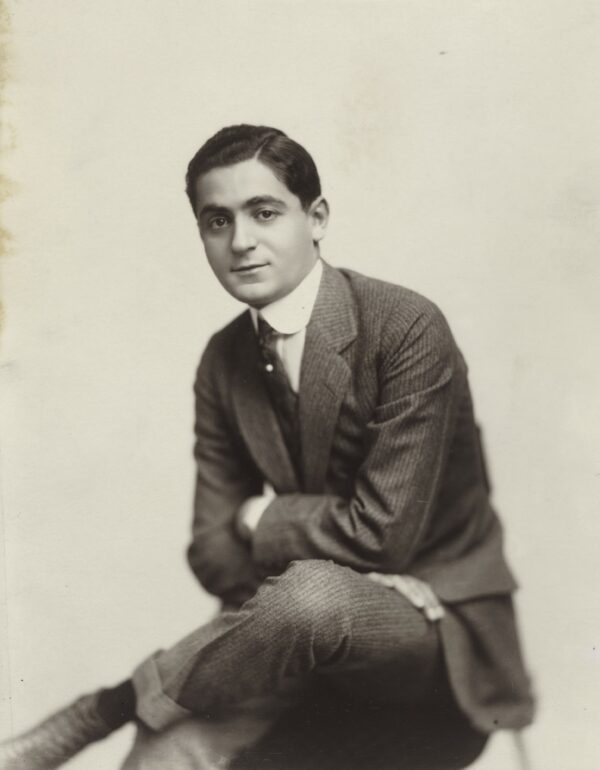
Irving Berlin, c. 1907. Courtesy of the National Portrait Gallery, Smithsonian Institution.
Berlin continued writing songs. In 1911 he wrote “Alexander’s Ragtime Band.” The song became a major international hit. Sheet music of the song sold one million copies in four months. Irving Berlin was then 23.
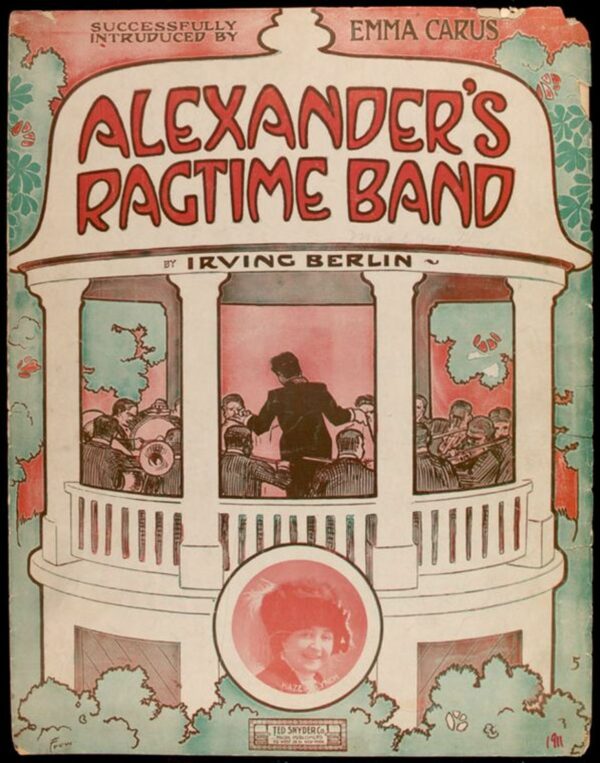
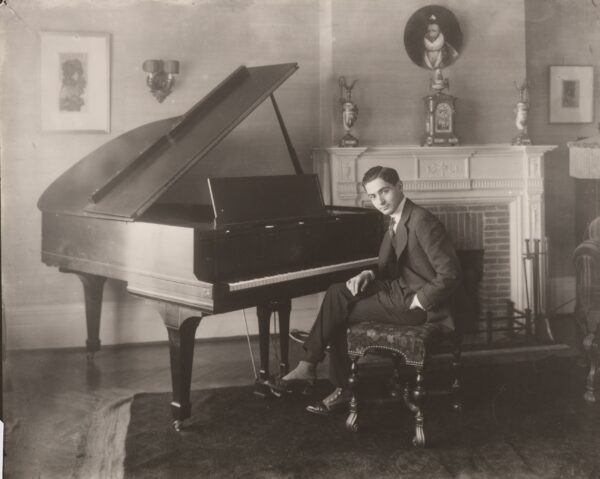
Irving Berlin, c. 1911. Courtesy of the National Portrait Gallery, Smithsonian Institution.
That same year Berlin married Dorothy Goetz. On their honeymoon in Cuba, she became ill with typhoid fever. She passed away after they were married for only six months. He wrote “When I Lost You” in memory of Dorothy.
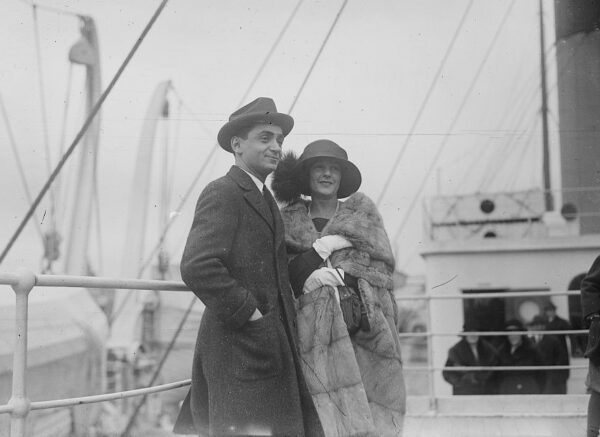
Irving and Dorothy Berlin. Courtesy of the Library of Congress.
The American Society of Composers, Authors, and Publishers was founded on February 13, 1914, to protect composers’ rights to profit from the sale and use of their songs. Irving Berlin and John Philip Sousa were pioneering members. The association now has almost one million members.
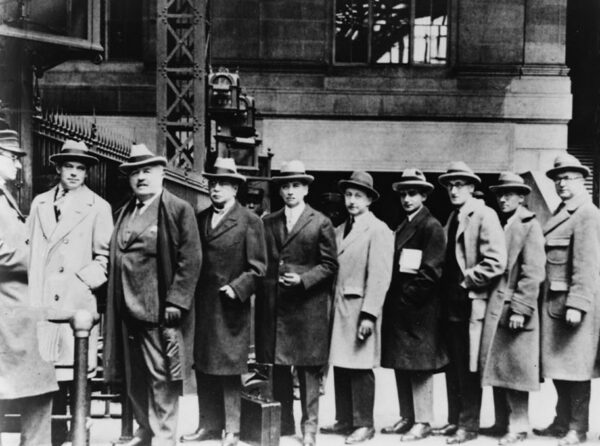
Here John Philip Sousa (of the men facing front, third from left)
and Irving Berlin (fourth from right) stand with other composers
at an unknown location c. 1920. Photo by Al Aumulle.
Courtesy Library of Congress.
Also in 1914, the first Broadway play with a full score by Irving Berlin opened at the New Amsterdam Theater. Another of his plays opened the next year. Among its songs was his famous “I Love a Piano,” which the Cumberland County Playhouse included in its rendition of White Christmas.
Berlin became a U.S. citizen early in 1917 and entered the U.S. Army that May, a few months after the U.S. entered World War I. Berlin was deeply patriotic. While in the Army, he wrote and put together a military revue called Yip, Yip, Yaphank. The cast included hundreds of soldiers. They rehearsed among the potato fields at Yaphank, Long Island. The play eventually moved to Broadway.
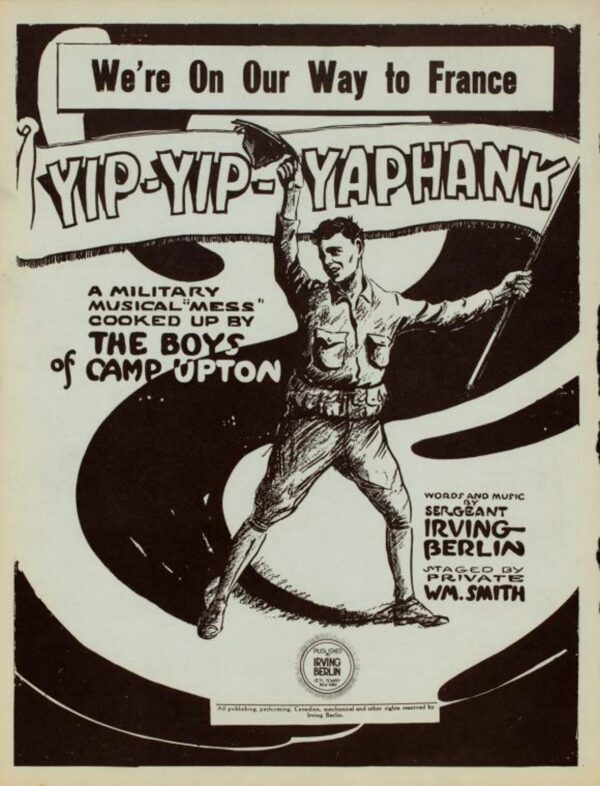
Courtesy of the New York Public Library.
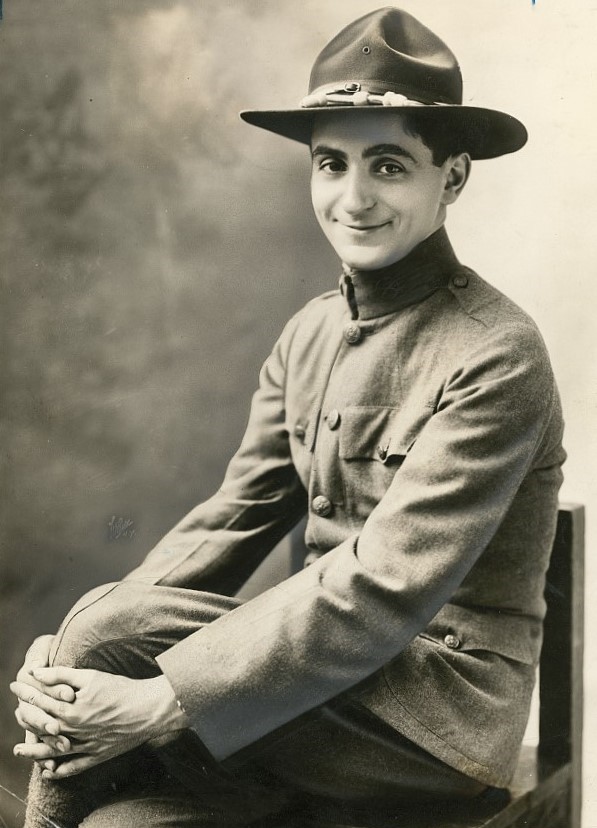
Sergeant Berlin. Courtesy of the Library of Congress.
Berlin’s success continued to soar. In 1926 he married Ellin Mackay. They were married until her death in 1988 after celebrating 62 years of marriage. The couple had three daughters. Their only son died in infancy.
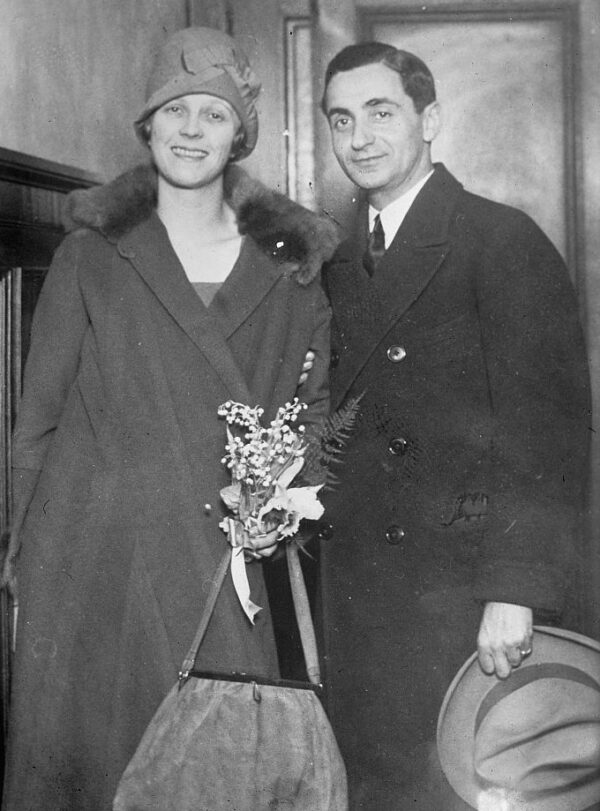
Ellin and Irving Berlin. Courtesy of the Library of Congress.
Berlin continued his successful career on Broadway, even during the Great Depression, and he also had success in Hollywood. His 1935 film Top Hat, starred Ginger Rogers and Fred Astaire.

In the fall of 1938, war threatened to come to Europe. Berlin decided to write a peace song. Remembering a song he had first written for Yip, Yip, Yaphank, Berlin pulled it back out and reworked it. He completed a draft on October 31, 1938 and completed his final version on November 2. Thus one of America’s favorite songs was born: “God Bless America.” During those three days, singer Kate Smith contacted him wanting a patriotic song to perform on her radio show. The show was to be broadcast on November 10 at the New York World’s Fair in commemoration of Armistice Day, which celebrated the end of World War I. The song was an instant hit. Berlin gave his royalty money from the song to charity with the money going to the Boy Scouts and Girl Scouts. Ray and I were thrilled to hear the Air Force’s Singing Sergeants and the audience sing “God Bless America” at the U.S. Air Force Band concert we attended recently.
When America entered World War II, Berlin created the play, This Is the Army, with a cast of real soldiers. This Is the Army played on Broadway and then toured the country.
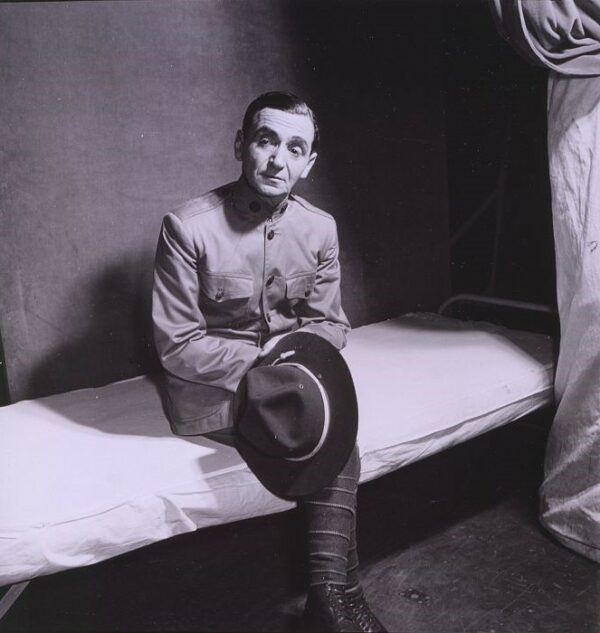
Irving Berlin, 1942. Courtesy of the Library of Congress.
In 1943 the cast of soldiers went to Hollywood to make This Is the Army into a movie. Its star was Lieutenant Ronald Reagan. The cast also toured army bases near battles in Europe and the South Pacific. These tours continued through the fall of 1945. Berlin’s efforts raised more than six million dollars for the Army Emergency Relief Fund. For this, Berlin received the Medal of Merit.
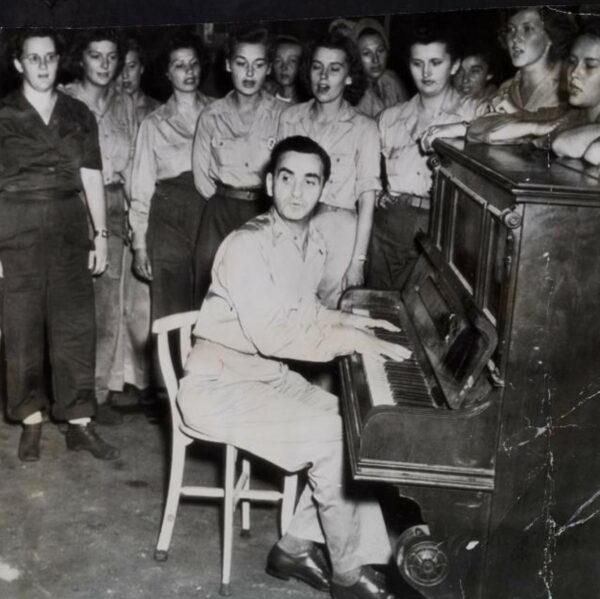
Irving Berlin sings with WACs in New Guinea on December 30, 1944, while on tour with This Is the Army.
Berlin continued to compose during the war. He wrote the song “White Christmas” in 1942 for the movie Holiday Inn, starring Bing Crosby and Fred Astaire. The song became a big hit for Bing Crosby. The movie White Christmas was released in 1954.
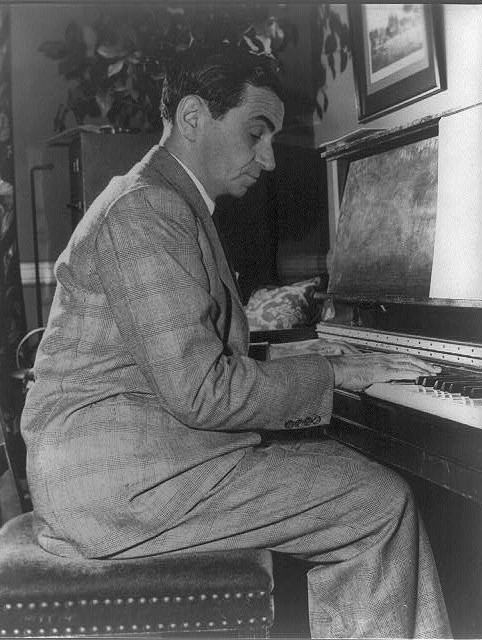
Irving Berlin, 1948. Courtesy of the Library of Congress.
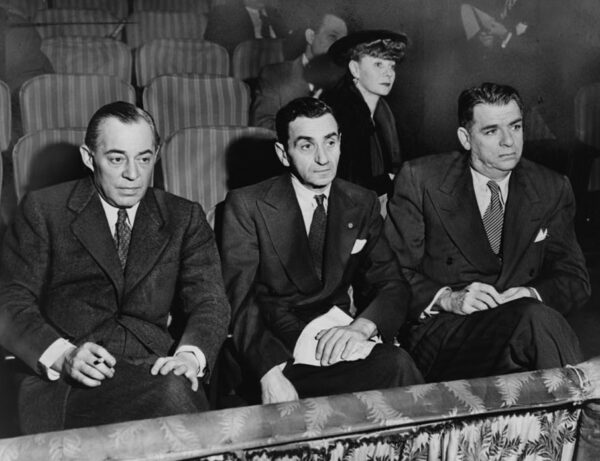
Richard Rogers, Irving Berlin, Oscar Hammerstein. Courtesy of the Library of Congress.
Irving Berlin passed away in his sleep in his home in New York City on September 22, 1989. He was 101 years old. His wife Ellin had passed away the previous year.
In 1949 Irving Berlin stood before a Broadway marquee advertising his new play, Miss Liberty, which celebrated the statue he had seen in New York Harbor when he was five years old, just eight years before his cantor father passed away and he began working as a singer himself. When Ray read Berlin’s brief biography in the play program at the Cumberland County Playhouse, he thought about Berlin’s productive life and his hard work from age 13. Ray said, “What he didn’t do was protest and demonstrate and talk about how unfair things were.” I would like to add that another thing he did was to draw Americans together every time we sing (and plead) “God Bless America.”
In all labor there is profit,
But mere talk leads only to poverty.
Proverbs 14:23

